- Home
- John Harris
Covenant with Death
Covenant with Death Read online
About the Author
John Harris was born in 1916 and grew up in South Yorkshire. He became a journalist and worked for the Rotherham Advertiser and the Sheffield Telegraph, joining the RAF as a corporal attached to the South African Air Force during the Second World War and returning to journalism when the war ended.
He became a full-time author after the success of his 1953 novel The Sea Shall Not Have Them, which was made into a film. He wrote more than eighty works of fiction and non-fiction, including books under pseudonyms Max Hennessy and Mark Hebden. As Hebden he created the crime series featuring Inspector Pel, which his daughter Juliet continued after his death in 1991.
Also by John Harris
The Lonely Voyage
Hallelujah Corner
The Sea Shall Not Have Them (US: The Undaunted)
The Claws of Mercy
Getaway (US: Close to the Wind)
The Sleeping Mountain
Road to the Coast (US: Adventure’s End)
Sunset at Sheba
The Spring of Malice
The Unforgiving Wind
Vardy
The Cross of Lazzaro
The Old Trade of Killing
Light Cavalry Action
Right of Reply
The Mercenaries (US: The Jade Wind)
The Courtney Entry
The Fledgelings
A Kind of Courage
The Mustering of the Hawks
The Professionals
Smiling Willie and the Tiger
Ride Out the Storm
The Victors
Take or Destroy
The Interceptors
The Fox from His Lair
The Revolutionaries
Cotton’s War
Swordpoint
Harkaway’s Sixth Column
A Funny Place to Hold a War
Up for Grabs
The Thirty Days’ War
China Seas
Picture of Defeat
So Far from God
COPYRIGHT
Published by Sphere
ISBN: 9780751557114
All characters and events in this publication, other than those clearly in the public domain, are fictitious and any resemblance to real persons, living or dead, is purely coincidental.
Copyright © 1961 by John Harris
Foreword © Louis de Bernières 2014
Historical Note with kind permission of Andrew Jackson
The moral right of the author has been asserted.
All rights reserved. No part of this publication may be reproduced, stored in a retrieval system, or transmitted, in any form or by any means, without the prior permission in writing of the publisher.
The publisher is not responsible for websites (or their content) that are not owned by the publisher.
Sphere
Little, Brown Book Group
100 Victoria Embankment
London, EC4Y 0DY
www.littlebrown.co.uk
www.hachette.co.uk
Table of Contents
About the Author
Also by John Harris
Copyright
An Introduction by Louis de Bernieres
Author’s Note
Part One
Chapter 1
Chapter 2
Chapter 3
Chapter 4
Chapter 5
Chapter 6
Chapter 7
Part Two
Chapter 1
Chapter 2
Chapter 3
Chapter 4
Chapter 5
Chapter 6
Part Three
Chapter 1
Chapter 2
Chapter 3
Chapter 4
Chapter 5
Chapter 6
Historical Note
An Introduction by Louis de Bernières
John Harris was an author who was quite extraordinarily prolific. He wrote a book almost every year from 1951 onwards, and in many years published more. He wrote under three names: Mark Hebden, Max Hennessey and his real one. In addition, he was a cartoonist. My reaction to seeing the list of his publications was one of sheer astonishment. According to his son, Max, he treated writing as a proper job and started work at nine on weekdays, ready to ‘burst out of his office’ at five. Even so, his fecundity is worthy of a tropical jungle.
The foundation of his success was The Sea Shall Not Have Them which was published in 1953, and subsequently filmed, which enabled him to become a full-time writer. Thereafter, unlike most authors who have a big success, he never took his eye off the ball. My father knew him in West Wittering and remembers that he was ‘very sedentary’, which would certainly suit a fabulously productive writer, but this was right at the end of his life. Harris’s children remember him as walking so fast that they could not keep up with him. He earned a pilot’s licence in his fifties, and somehow even got caught up in a riot in Paris.
Covenant with Death appeared in 1961 and is a classic. It has the hallmarks of many of the war books published in the 1950s, which I devoured in the 1960s when I was in my teens. That is, it is intelligent without being pretentious and is both readable and compelling. It is great literature without ever being ‘literary’. The style is close to what Roland Barthes called ‘Writing Degree Zero’, a style so plain and clear that it is the style of having no style. Harris is sparing with adjectives and adverbs, except when there is action to be vividly described. You will not often even find the word ‘very’. A great deal of his writing consists of dialogue, which gives much of the book a casual and jaunty air. The only infelicity I have found – the pleonasm ‘incredulous disbelief’ – should have been picked up by whoever was the editor or proofreader.
The story follows the trajectory of characters who are completely believable, and about whom we care, none of whom is particularly out of the ordinary. All of these war books are in fact about love – the kind of deep, intimate, asexual love almost unknown to most of us, which we call ‘comradeship’ without understanding how profound that is. The Australian concept of ‘mateship’ comes close. No one can understand how war is tolerable to those caught up in it, unless they understand that one’s primary motive is to not let down one’s comrades, and that a bond develops even between those widely separated by rank, which has no equivalent in civilian life. These are the friends you would die for if you could save them, who you will value all your life, and for whom you will grieve all your life if they are killed.
This is the literature of the ordinary person made extraordinary by war. It compares with Nicholas Monsarrat’s The Cruel Sea, a classic ten years older, about civilians who became sailors on the Atlantic Convoys. It is a book that teaches the serious writer how to write about violence, because the only way to do that is to state it plainly, otherwise the moral force is lost. Another obvious comparison is with Erich Maria Remarque’s All Quiet on the Western Front.
The difference is that Remarque served in the trenches and Monsarrat served on the Atlantic convoys – they were writing about what they intimately knew and vividly remembered. Whereas Harris, although not a stranger to personal heroism (he once saved the life of a drowning boy in Switzerland), was born in the year in which the story of his novel culminates and served in the RAF in the Second World War.
Covenant with Death is a miracle of authenticity. Harris was no doubt familiar with the stories of the various ‘Pals’ regiments; for example, the Sandringham detachment from the Royal estate in Norfolk, which appeared to vanish into thin air at Gallipoli. The Turks maintained that a mist came down on them as they advanced, and when it lifted the Sandringham detachment had disappeared. However, the fact is that Harris grew up hearing the stories of the Somme. His fa
ther took part, as did his father-in-law, brother-in-law and four uncles. His brother-in-law and one uncle were gassed, two uncles lost their legs and another was killed. When Harris was a newspaper man on the Sheffield Telegraph he worked amongst the very people who had volunteered for the Sheffield City Battalion – the heroes of this book. Covenant with Death is very evidently full of genuine history and biography; it would have been impossible that a novel as realistic and detailed as this could have been purely invented.
I do not want to repeat clichés about ‘the futility of war’. The fact is that the Battle of the Somme was meticulously planned in the face of very real difficulties. For example, having to work alongside the French army which, because of the fear of mutiny, was committed only to defence; also, the need to send troops to Italy when the Italian front collapsed. It is, I think, unfair to talk of lions led by donkeys. Furthermore, great victories nearly always depend upon surprise, and this was the first war in history where complete surprise was always impossible. The aircraft up above at all times meant that one always knew what the other side was up to. This is why the Germans did not reach Paris at the outset of the war, and in my judgement it is the reason why the Western Front became bogged down. Under these conditions it was, as Von Moltke once said, inevitable that ‘one’s battle plan survives up to exactly that moment when one encounters the enemy’.
I also think that we have paid too much attention to the war poets, eloquent though they are. Most people did feel that the war was worth it. My grandfather was maimed in that war, and ultimately committed suicide, but he did not doubt that the war had been just, and was proud to have fought in it. His generation understood it as ‘The War for Civilisation’; I think of it as a war for democracy. Germany would never have gone to war if it had been a democracy, and would not have done so again if it had remained one. Harris seems to leave the judgement about ‘futility’ open, as a good novelist probably should.
The whole point of the novel lies in the thirty pages of the last two chapters: a genuine, shocking climax that I do not think has been equalled elsewhere. The penultimate chapter is a passage of relentlessly sustained, virtuosic writing, describing in detail, without repetition and with mounting crescendo, the first hours of the Battle of the Somme. It is difficult to read it without an awful feeling of dismay, horror and darkness invading the room where one sits. One can feel one’s own bones shadowed darkly through the flesh.
The last chapter is a meditation upon what it all meant. Its last paragraph consists of a long list of reasons for fighting, is followed by two terse, verbless sentences, and a final one of only four words. They are like muffled blows on a kettle drum at the end of a symphonic tempest. This writing is masterly and the emotional effect devastating.
Louis de Bernières
June 2014
Author’s Note
This book is based most clearly on facts, and to obtain them I have read almost everything possible on the subject by the men who were there, to whom I owe a great deal for their acute observation and their deep feeling for the period.
However, while the unit with which it is chiefly concerned is solidly founded on an actual one, it is still a work of fiction and the characters in it are fictitious; though some of those men, now growing old, from the city where I lived, who told me of their experiences with such amazing modesty, will inevitably recognise many of the incidents in the story. To those men also I am very much in debt.
Part One
We have made a covenant with death and with hell are we at agreement.
ISAIAH xxviii. 15
1
I shall remember that morning till the day I die. Not just the courage and the horror and the incredible strange beauty. Everything. The faith we had in our leaders and the pride we had in ourselves.
Even now, after all these years, I remember the feeling that was in us that we should succeed where others had failed, the naïve certainty that we were greater than our predecessors; that upon us rested the future of the world and because of this it was well worth all that we were facing; that we, because we’d been chosen for the task, walked among higher spheres than our fellow-men.
We were joined in spirit. We were each of us, that morning, only too well aware of the others around us; only too well aware of their faith, and their courage, and their certainty, too; and of the completeness of the company we were in, of its absolute welded oneness. That was what sustained us. It wasn’t just me, Mark Fenner, I remember. It was all of us.
And to understand that you have to go back to the beginning, to the very first day we all came together, nearly two years before.
I was awake at six o’clock that first day.
Not that I’d slept much. I’d hardly closed my eyes. I put it down to excitement, in an effort to convince myself I wasn’t too full of emotion or disturbed by what lay ahead of me.
I was a reporter on the Post at the time, and when the war came in August 1914 – this war we’d all been half-expecting for years – the only immediate difference I noticed was the sign outside Stahlers’ teashop, behind the office, which used to supply the reporters and sub-editors with sardines on toast and pots of tea on battered tin trays. They were German-Swiss, the Stahlers, and the day after the war broke out there was a single card tied on the brass door handle just under the scratched advertisement for Oxo. Under New Management, it said firmly. In bold letters scrawled in blue crayon on the back of a Woodbine box – bold letters that let you know that there’d been no nonsense about it. The Germans were out, and the Swiss were in. That was all.
In London it was different. There, pacifist speakers in Trafalgar Square were being mobbed, and the mounted police had been called out. When Sir Edward Grey, the Foreign Secretary, had rejected the German demands, a crowd had surged to Buckingham Palace demanding to see the King and shouting, ‘We want war!’
German Jews were putting up their shutters, and the nabobs of the West End were taking down the pictures of their German ancestors. The Americans had left in their nickel-plated cars, and the stock markets were unsteady because the arithmetic kings and diplomats were hurrying back to their capitals from Bad Ischl and the German spas with their cures incomplete. There’d been a run on the banks and the air had become electric. The tension had been so great in London that only a declaration of war could relieve it.
But that was London. They’re a harder-headed people in the north and not so easily roused. Apart from Stahlers’ sign, the crowds outside the food shops and the small groups of men in boaters and caps who ranged about the High Street for a day or two, apparently with nothing better to do than break into the ‘Marseillaise’ and ‘Rule, Britannia’ from time to time, there didn’t seem to be much difference from peace time. Occasionally you saw a woman with a taut face and a sniffling child – but not often – and now and then a Territorial in ill-fitting khaki going off to join his unit, probably a little drunk, with all his friends round him urging to give the Germans hell, or keep his head well down, or both.
The first squad of soldiers that appeared on the streets was cheered to the echo as they marched to the station, laden down with their equipment and their stiff new kit bags, their straps wrenching their khaki uniforms askew, their peaked bus conductors’ caps clumsy and awkward on their heads. But there wasn’t much else – just a heart-cry from the city industrialists that trade with France would never be the same again and that commerce with Germany would stop altogether. Up there in Yorkshire, steel and wool still seemed to be far more important than that Belgian and German and French boys were lying in crowded ditches along the flat Flanders fields, startled to find that the war they’d rushed to so eagerly, their cannon decorated lovingly with flowers by the girls, wasn’t quite what they’d expected, and that they were dying and that the blood on their dusty hands was their own.
I was on holiday at Scarborough when my turn came. The resorts had been saying Everything as usual for days, in an effort to squeeze the last joyous ounce out of the su
mmer trade before it finished for good, and they were still doing a booming business; and none of us thought that the rash of red, white and blue posters – YOUR KING AND COUNTRY NEED YOU, your country calls on all unmarried men to enlist at once in the ranks of the Army – referred to us. We hadn’t private incomes, so we weren’t commissionable types, we’d decided in the Reporters’ Room of the Post, right from the beginning, and we knew we weren’t the class they normally recruited the rank and file from in those days, so there seemed nothing to do but carry on as usual. It wasn’t a desire to shirk. It was modesty or, perhaps more properly, lack of thought.
We hadn’t got used to the idea of war in England, you see. The mobilisation notices hadn’t dropped through the letterboxes in every street in the kingdom as they had in France. They hadn’t taken away whole staffs and closed shops, and there’d been no groups of hairdressers and chefs marching down the Mall singing, no massed phalanxes of conscripts and Reservists tramping off to the stations under home-made banners to report to their regiments, as there had in Paris. Even the warships at Portsmouth didn’t look very different from normal, because there were always warships at Portsmouth. All they’d done was take the covers off their guns, post submarine lookouts and keep their lights doused at night. We’d never experienced the day when millions of men had kissed their wives goodbye with dry lips and burned their letters as they had across the Channel. All we’d done was put a bobby on the German Embassy, while the hoipolloi, in a fit of entente-cordiale-ism and a revulsion of feeling against all things Prussian, had taken to drinking Vichy with their whisky instead of Apollinaris which came from Germany. Even the skirmishings in Belgium hadn’t meant very much to us. We often wondered where Kitchener was going to get all the recruits he was said to be after. We never dreamt he meant us.
Mons changed all that. The news that British troops had at last come into action against the Germans had been cheered from one end of Scarborough promenade to the other. The result seemed a foregone conclusion. Wasn’t one Englishman equal to two Germans, three Frenchmen and any amount of niggers?

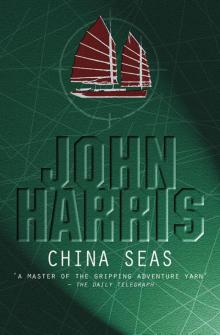 China Seas
China Seas The Mercenaries
The Mercenaries Road To The Coast
Road To The Coast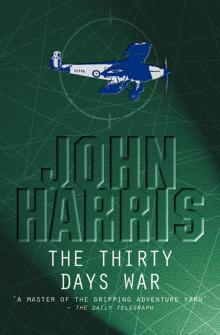 The Thirty Days War
The Thirty Days War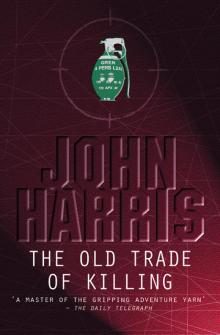 The Old Trade of Killing
The Old Trade of Killing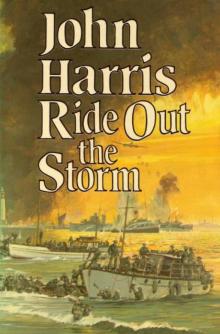 Ride Out The Storm
Ride Out The Storm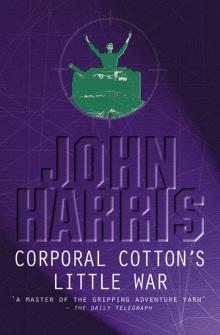 Corporal Cotton's Little War
Corporal Cotton's Little War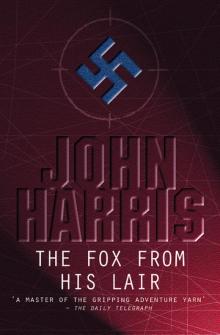 Fox from His Lair
Fox from His Lair Paint The Rainbow
Paint The Rainbow Flawed Banner
Flawed Banner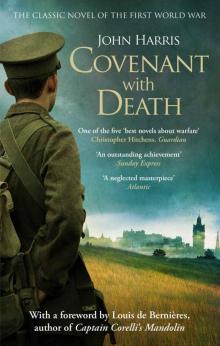 Covenant with Death
Covenant with Death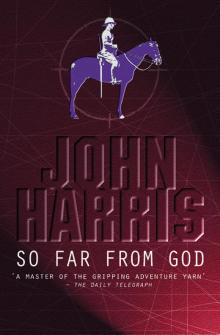 So Far From God
So Far From God The Sea Shall Not Have Them
The Sea Shall Not Have Them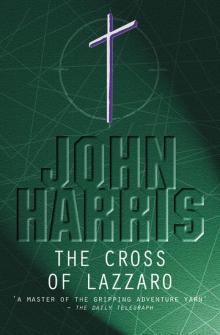 The Cross of Lazzaro
The Cross of Lazzaro Smiling Willie and the Tiger
Smiling Willie and the Tiger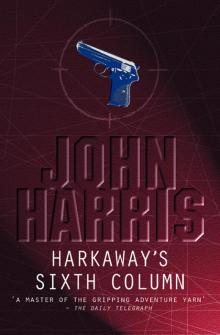 Harkaway's Sixth Column
Harkaway's Sixth Column The Sleeping Mountain
The Sleeping Mountain The Claws of Mercy
The Claws of Mercy North Strike
North Strike Picture of Defeat
Picture of Defeat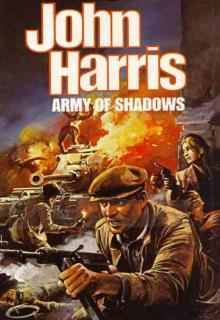 Army of Shadows
Army of Shadows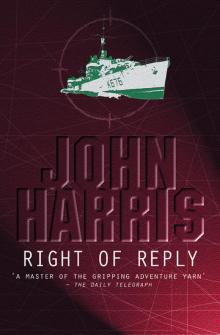 Right of Reply
Right of Reply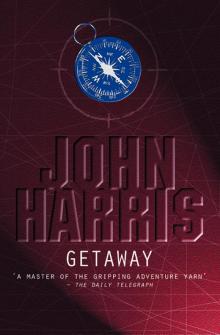 Getaway
Getaway The Lonely Voyage
The Lonely Voyage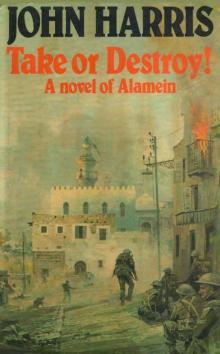 Take or Destroy!
Take or Destroy!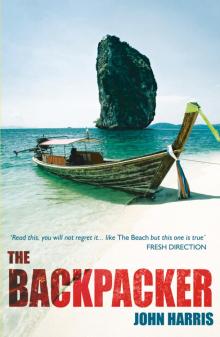 The Backpacker
The Backpacker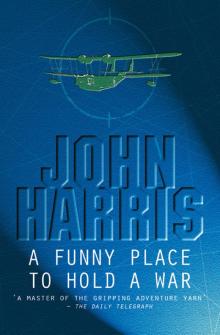 A Funny Place to Hold a War
A Funny Place to Hold a War Swordpoint (2011)
Swordpoint (2011)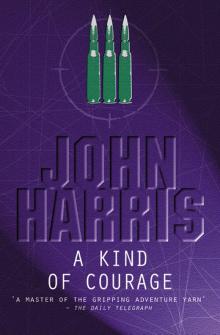 A Kind of Courage
A Kind of Courage